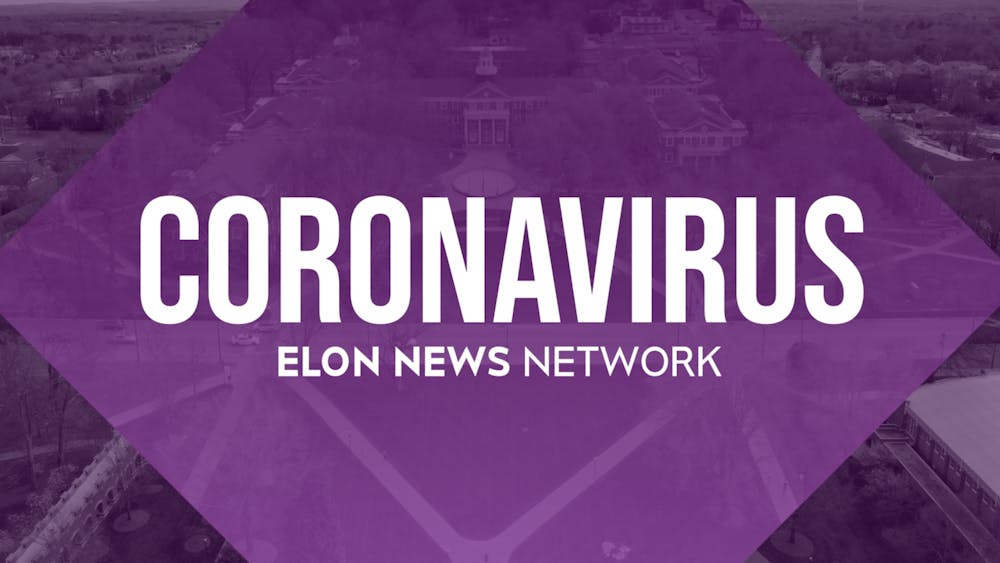Elon University announced a new mask policy in which students, faculty and staff are required to wear face coverings while indoors as well as outdoors when six feet of physical distance cannot be maintained. The new mask system went into effect 5 p.m. today.
The new policy comes after North Carolina Gov. Roy Cooper announced he will require people in the state to wear face coverings in public places.
Jeff Stein, the chair of the Ready & Resilient committee for Fall 2020 and the vice president for strategic initiatives, said requiring students to wear masks was a logical next step.
“We have been paying attention to this growing evidence and research showing that wearing masks or face coverings is the most effective way to limit spreading COVID-19,” Stein said. “We had been working on our policy that would come out in July. So, once the governor released his order it just seemed like we would tie all this together and be able to release our new policy now.”
According to an email from Stein, students, faculty and staff can use masks provided by the university or from their own supply. Students are not required to wear masks in their residence halls or apartments and faculty and staff are allowed to take their mask off when they are in their own offices or work spaces. Students, faculty and staff are also allowed to remove their mask when they are actively eating or exercising.
If students, faculty, and staff do not wear a face covering in university facilities, they will be asked to leave. Guests, visitors and vendors are also expected to follow these guidelines.
There will be consequences for those who are intentionally putting others in harmful situations, but that is not the objective.
“The goal overall is that the community is educated,” said Jenni Spangenberg, director of student conduct. “But when there's intentional choices that are potentially harming the community or oneself, that's where most likely you get referred to our office.”
According to Spangenberg, cases involving the new mask policy will be treated like any other case brought up to student conduct: on a case-by-case basis.
“Anytime a situation is referred to our office we're going to make the determination of what's the appropriate path related to student conduct to follow up with,” Spangenberg said.
Generally, with mask cases, enforcement will fall under two provisions in the university social policies according to Spangenberg: the endangering self and others provision and the university policies provision.
Some of the disciplinary actions for first offenses under university social policies include fines, restitution and possible disciplinary probation with the potential of a disciplinary suspension for up to a year.
Students with disciplinary probation status cannot participate in study abroad or other trips that involve leaving campus and cannot hold leadership positions. Students who receive disciplinary suspension are removed from Elon’s campus for an allotted period of time.
Students who receive a second offense would receive similar penalties except at a minimum they would receive disciplinary suspension status and could possibly receive permanent separation status, meaning they would be permanently removed from the university.
Students who have third violations typically get permanent separation.
Violating the university policies provision means a student has acted in a way that is prohibited by written university, dean, or program policy.
There is no set consequence for violating the mask policy. All action taken in response will according to the code of conduct and “consider the cumulative impact of all policy/rule violations.”
Faculty who fail to comply with these regulations will be handled by human resources.
According to Stein, there are consequences because of the seriousness of the situation.
“If the circumstances were less dire or involved less serious consequences then it would be easy to just say this isn't that big of a deal,” Stein said.
However, Stein said he hopes students will keep each other accountable.
“In this situation where there's really no way to know at all times if you have a virus, or if the person you're interacting with is immunocompromised or has a family member who is immunocompromised, we have to be extra careful and we really have to push each other to follow these guidelines,” Stein said.
Stein suggests students, faculty and staff use phrases like “mask up” or “no mask, no class” as reminders.
There are exceptions to this new mask policy. Individuals who are unable to wear masks due to a medical or behavioral condition or disability can wear alternatives to masks like face shields and physical distance themselves at all times as well. These accommodations must be registered with Disabilities Resources. They will begin taking requests for these accommodations starting July 2.
Deans also can give students and faculty permission to forgo this policy if it is necessary to meet course requirements, but in these classes physical distancing is required at all times.
According to Stein, students will receive masks at the health check-in in Schar Center. Here they will receive a health kit which includes an Elon-branded mask and thermometer, hand sanitizer and tissues. Details about when these events will be happening will come out later in the summer
Students who need masks sooner can find disposable masks at the front desk of Moseley Center.
Going forward, Stein hopes students help implement this policy.
“Our lives,” Stein said, “are in each other's hands.”


